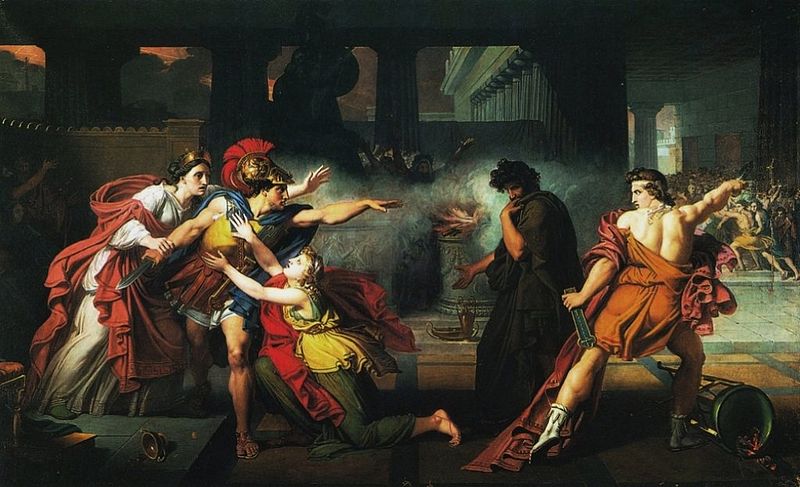ETEOCLES IN GREEK MYTHOLOGY
Eteocles in Greek Mythology
According to Greek mythology, Eteocles was a king of Thebes, a son of Oedipus and brother of Polynices. Eteocles was king of Thebes, when the events of the Seven Against Thebes occurred.
Eteocles Son of Oedipus
Eteocles was the son of Oedipus and Jocasta; Oedipus having unwittingly killed his father and married his mother. The incestuous relationship had brought forth four children, two sons, Eteocles and Polynices, and two daughters, Antigone and Ismene.
Eteocles and the Curse of Oedipus
|
When his crimes became known, Oedipus was deposed, and to hide his and his brother’s own shame, in terms of their parentages, Eteocles and Polynices, kept Oedipus imprisoned in his own home.
Oedipus would curse his two sons, proclaiming that neither Eteocles nor Polynices would peacefully, or successfully, become king of Thebes. Oedipus was then exiled from Thebes by his own sons. |
|
King Eteocles of Thebes
To try and circumvent Oedipus’ curse, Eteocles and Polynices agreed to share the rule of Thebes, with each brother ruling in alternate years.
Eteocles would rule Thebes in the first year, but at then of that year, Eteocles refused to yield the throne to Polynices, breaking the promise made between the brothers. Eteocles, who had the support of the Theban people, forced Polynices into exile.
Whilst King of Thebes, Eteocles would become father to a son, Laodamas, by an unnamed woman.
Eteocles would rule Thebes in the first year, but at then of that year, Eteocles refused to yield the throne to Polynices, breaking the promise made between the brothers. Eteocles, who had the support of the Theban people, forced Polynices into exile.
Whilst King of Thebes, Eteocles would become father to a son, Laodamas, by an unnamed woman.
Eteocles and the War of the Seven
Whilst the rule of Eteocles continued, Polynices had found refuge in Argos, where he also found allies in his cause, including King Adrastus. With the belief that Polynices was the rightful ruler of Thebes, an Argive army was raised. Thus, the war known as the Seven Against Thebes began.
Now, Eteocles may have broken a promise, but Polynices had now raised a foreign army to invade Thebes, something which could only bring about death and destruction for the kingdom he sought to rule.
Now, Eteocles may have broken a promise, but Polynices had now raised a foreign army to invade Thebes, something which could only bring about death and destruction for the kingdom he sought to rule.
The Death of eteoclesBefore any fighting took place, Tydeus, came from the Argive force, to ask for Eteocles to yield, but Eteocles refused.
The Seven commanders of the Argive army lined their forces up against the seven gates of Thebes; and each of the seven gates of Thebes was defended by a named defender. Thus, it was, that the gate that Polynices faced was defended by Eteocles. When battle commenced forces on both sides were decimated, and eventually it was decided that the war should be brought to a close after a single-combat fight between Eteocles and Polynices. When Eteocles and Polynices fought they ended up killing each other. Though not a decisive end to the war, the surviving Argive forces withdrew, for the Seven, aside from Adrastus, were now dead, and the walls of Thebes still stood firm. Laodamas was too young to rule, and so in his stead, Creon, became regent of Thebes, although, when, ten years later, the Epigoni came to Thebes, Laodamas was indeed king. |
|
|
|
Colin Quartermain - Eteocles - 19th February 2020
